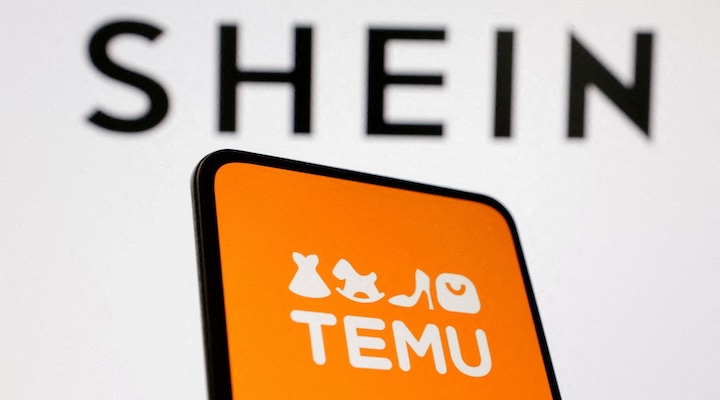E-commerce platforms Temu and Shein have suspended their operations in Vietnam following non-compliance with the country’s e-commerce service registration requirements. An official statement on Temu’s Vietnam website says Temu is engaged in discussions with the Vietnam eCommerce and Digital Economy Agency and the Ministry of Industry and Trade to establish proper registration for its e-commerce services. Vietnamese regulatory authorities and local businesses have raised substantial conce
concerns regarding the pricing strategies Chinese e-commerce platforms implement, while the Ministry of Trade has identified potential risks associated with the distribution of counterfeit products.
Regulation changes
In November, Vietnam’s parliament approved changes to a tax law requiring local operators of foreign e-commerce platforms to pay Value-Added Tax (VAT). The parliament also called on the government to eliminate tax exemptions for low-cost imported goods.
This legislative change will affect the foreign-dominated e-commerce industry, which has enjoyed both VAT exemptions and duty-free status for imported goods valued under 1 million dong – benefits that have been in place since 2010.
“If Vietnam imposes these curbs on cross-border e-commerce, it will be quite a story. It will be the first example of a Southeast Asian country carrying out protectionist cross-border e-commerce regulation since Indonesia did so several years ago,” Simon Torring, co-founder of Cube Asia, told Inside Retail.
Torring explained that the regulation’s implementation will have both immediate and long-term effects.
“The immediate effect is that overseas goods will become more expensive for Vietnamese consumers and face longer delivery times due to customs checks. This will directly impact cross-border platforms like Temu, Shein and AliExpress, along with overseas sellers on Shopee, Lazada, and TikTok Shop,” he said.
“We estimate cross-border e-commerce represents about 10 per cent of Vietnam’s e-commerce sales, meaning 2-5 per cent of the country’s annual e-commerce sales could be affected.”
As a result, both local and international e-commerce players operating within Vietnam will probably benefit from these market changes, with existing sellers gaining advantage and new sellers entering to meet demand.
Regional landscape
While Vietnam’s regulatory changes mark a shift in its e-commerce landscape, it’s important to understand these developments within the broader context of Southeast Asia’s e-commerce evolution and regulatory framework.
“Southeast Asia’s modern e-commerce industry, which we would claim started with the regional launch of Lazada in 2012, has always had a mix of foreign and domestic players. The market generally continues to be very open to foreign players, even in the most harshly regulated countries, such as Indonesia,” Torring said.
“What has definitely changed over the years is that the legal requirements for these foreign players to operate in Southeast Asia have become more well-defined and stricter. The most important requirement in most countries is that foreign players, just like the local ones, must have a local business entity and an e-commerce licence. But that is generally possible to attain.”
The expert states that most of what’s happening in e-commerce regulation at the moment has to do with two vectors of regulatory change – domestic e-commerce regulation and cross-border e-commerce regulation.
Domestic e-commerce regulation primarily aims to create a level playing field between offline and online retail. This includes aligning regulations and compliance requirements for both traditional shops and their online counterparts.
“For instance, requiring VAT/GST registration of sellers, which previously has not been the case in several countries in Southeast Asia. Platforms play a role here because regulators generally want the platforms to ensure compliance among their seller base, rather than putting the onus on each seller,” he added.
Cross-border e-commerce regulation has been simmering beneath the surface for several years and is now moving into the mainstream. Historically, consumers could import goods from overseas sellers without paying duties or customs handling charges for small personal purchases (typically below $50-$100, varying by country).
“This practice became extremely popular since it gave consumers access to cheaper or locally unavailable products. Over time, platforms like Shein, Temu, and AliExpress emerged as formal, powerful players serving this demand. The resulting regulatory scrutiny aims to create a level playing field between these cross-border platforms and domestic sellers – both online and offline – who must comply with local regulations and pay VAT and other taxes,” he said.
In October, Indonesia’s government required Alphabet’s Google and Apple to block the Chinese e-commerce platform Temu in their mobile app stores in the country as a pre-emptive measure to protect the country’s small and medium-sized businesses from the potential influx of low-priced products.
The company’s registration in Indonesia was reportedly rejected earlier this year.
Indonesia has adopted regulations to curb cross-border e-commerce for several years, most recently through last year’s ban on in-app transactions on social media, which caused TikTok Shop to halt transactions on its app before resolving the problem through an acquisition with local tech giant GoTo’s e-commerce unit.
“Indonesia was the first mover in imposing strict regulations to clamp down on cross-border e-commerce,” Torring said.
He expects more countries are following Indonesia’s example by reconsidering their stance on cross-border e-commerce, thinking through whether it makes sense to maintain this status quo or to block cross-border e-commerce to level the playing field fully with the incumbent local retail and wholesale industry.
“My guess is that we will see more and more countries lean towards what Indonesia has done,” Torring said.
“Foreign e-commerce platforms seem to get more scrutiny from regulators but I think it’s very important to bring in the nuance that the regulation doesn’t really have much to do with them being foreign – it’s being imposed on local as well as foreign e-commerce platforms. It’s just that for overseas players, the ‘step 0’ is for them to be registered and certified in the markets they wish to operate in, which is where Temu seems to have gone wrong in Vietnam,’ he concluded.
Further reading: Can Temu replicate its success in Western markets in Southeast Asia?

